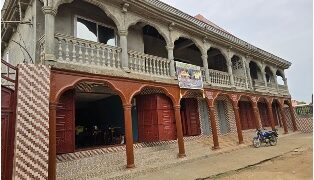By Alieu Amara Suwu
Office of the Attorney General and Minister of Justice has dragged the Electoral Commission of Sierra Leone (ECSL) to court over the Kenema District Council (KDC) Chairperson vacant position, which occurred due to the death of then substantive Chairman Mohamed Amadu Sesay (whom they fondly called O’Level Sesay).
The matter came up on Thursday, October 3, 2024, before Justice Alhaji Momoh Jah Steven.
Robert V. Kowa, the Solicitor General of Sierra Leone, while submitting in court that they have received the affidavit in opposition filed by the defendant ECSL, led in exhibit SK1 of his affidavit, a letter notifying the Minister of Local Government and Community Affairs of the death of the then Chairperson of the Council, which, according to the letter, occurred on the 6th of August 2024.
He said exhibit SK2 indicated that the Minister of Local Government, who is not a lawyer therefore, solicited a legal opinion from the Attorney General and Minister of Justice by a letter dated 15 August 2024 with respect to the position of the law as to fill in the said vacancy.
Kowa further stated that on August 19, 2024, the Attorney General responded to the said letter, proffering his legal opinion on how vacancies can be filled, especially when there is a lack or absence of any provision or expressed provisions in the Local Government Act of 2022.
He continued that the lack of such provisions definitely will bring out the necessity of invoking the rule of Casus Omissus—a situation omitted from or not provided by statute or regulation and therefore governed by the common law.
In his submission he also said that exhibit SK3 is a letter dated 18 September 2024 from the Permanent Secretary Ministry of Local Government to the Chairperson of ECSL, asking about the legal opinion from the Attorney General; exhibit SK4 a gazetted noticed announcing dates for nominations and election with respect to the filling of the vacancy through a bye election of the vacant position of Chairperson of the Council; and exhibit SK5 a response from the ECSL directed to the Ministry of Local Government, indicating the preparations for the election and subsequently stating that the Commission is cognizant of section 15 of the Local Government Act of 2022 but does not provide the filling of vacancy, and when such occurs the Commission relies on sections 7&105 of the Public Elections Act of 2022 and sections 9&10 of the Local Government Act of 2022.
He further submitted that even though the legal opinion of the Attorney General is not a law but a respective authority, adding that whether on a true and proper absence of any provisions, the deputy should occupy the position of the Chairperson pursuant to sections 13 and 15 of the Local Government Act of 2022.
Lawyer Kowa added that whether the absence of the substantive chairperson is temporary or permanent, it is crystal clear that the office has become vacant, adding that death constitutes both silence and absence.
He underscored the fact that both the chairperson and his deputy were elected by the residents through universal adult suffrage and must be taken into consideration.
Solicitor Kowa further submitted that ravaging the entire Local Government Act, the only provision that talks about vacancy and how it can be filled in the absence of the district council chairperson can be found in Section 15(1) of the said act, which is so instructive.
He continued that both the chairperson and his deputy were elected on a joint ticket and therefore inseparable when it comes to elections, and went further to indicate that the only thing that can separate them is death.
Kowa pointed out that Section 15(3) of the said act is the only expressed provision of the act, and Parliament, in its wisdom, stated that, to fill in a vacant position, the deputy shall assume the position of district council chairperson.
Kowa said Section 15(3) of the said act is clear, simple, straight forward, and unambiguous, adding that when the head is absent, the deputy must be in control.
He said the intention of Parliament was to give the provision a meaning that may not result in absurdity or inconsistency because the fact has stated that the deputy must act in the absence of the substantive, which is a simple way of averting a bye election.
Kowa said if the intention of Parliament was to allow the conduct of a bye election, it should have expressly provided for it.
He said in the 2004 Local Government Act, which was repealed and replaced by the Local Government Act of 2022, it was clearly stated that a bye-election must be conducted to fill a vacancy of the District Council Chairperson but was omitted in the new act.
Robert Kowa argued that as lawyers they must not fill a gap under the guise of interpretation and the court must give effect to what the Act says or permits and not to what it thought it ought to be.
He further said that the court should not supply a legal omission that could lead to undesirable consequences, saying that doing so is a legislative and not a judicial function because the court has no power to fill such an omission.
He therefore dismissed sections 9 and 10 of the Local Government Act, which are the provisions relied on by the legal team of ECSL, which he carefully contended cannot be imported to fill a vacancy that occurred under sections 13 and 9, which talk about a vacancy in the seat of councilors.
He further states that upon the death of a councilor, sections 9 and 10 of the said act are very clear and specific because they mention the conduct of a bye-election to fill a vacancy when there is the demise of a councilor.
Kowa, however, went on to note that the same does not apply with the death of the district council chairperson.
He said with the insertion of Section 13 of the Act, Parliament is deliberate not to conduct a bye election at the expense of filling the vacancy through replacement by the deputy, which is the best practice nationally and internationally.
He mentioned Section 49(4) of the Constitution of Sierra Leone, 1991, which rightly states that the Vice President must assume the duties and functions of the President in the event when there is a vacancy in the seat of the Presidency. In that when he warned that the importation of non-applicable laws will lead to crisis.
He ended his submission by clarifying a statement provided as evidence in the affidavit of the defense that Justice Stevens did not grant an interim injunction on the conduct of a byelection but a stay which should not be interpreted as an argument. He said they are of the view that if the questions are answered in the affirmative, then the deputy must be allowed to occupy the seat of the former District Council Chairperson.
Emmanuel Saffa Abdulai, as lead defense for ECSL, in his response, argued that a councilor is a member of the local council, and the composition of the council begins with the Chairperson, and thereafter a deputy and the councilors.
He said therefore if sections 9 and 10 of the Local Government Act of 2022 make it mandatory for a councilor to be replaced through a bye-election in the event of the death of a councilor, the same could apply when the head of the District Local Council dies.
He further states that in their affidavit in opposition, Exhibit ESA1 is the expert originating summon dated 27 September 2024 and has to stay by the court.
He said EAS3 is a legal opinion from the Attorney General office to the Ministry of Local Government. ESA4 is noticed from the defendant ECSL for the conduct of elections for the Kenema District Council. ESA5 he said is the Gazette of notice published by the Government Printing Press on the instructions of the defendant.
He said there are several other paragraph they relied on with the exhibit submitted in their affidavit.
Lawyer Saffa Abdulai also argues that a sitting Chairperson of the Kenema District Council died in office and that triggered two possibilities: one is temporal filling of the office after the person has vacated the office by reason of death and two is to conduct election to fill the vacancy.
He said the Local Government Act of 2022 triggers the process for conducting elections within 90 days as provided by law.
He said it is that process that leads them in court whether election should be conducted or the deputy should take up office.
In his submission, he asked who is the council, as argue by the state, the office of the councilor is not different from the Chairperson.
He said councilor means member of local council and district council chairperson is also member of the council.
He said section 9 of the Local Government Act applies to everyone in the council. He said section 9 talks about the vacancy seat of councilors and section 10 of the said act talks about how to fill the vacancy in conducting election by ECSL.
He said there is no omission in the Act as stated by State Counsel Kowa and this can only be fixed by conducting a bye election.
He asserted that this is first in history that chairperson bye election should be treated special.
He said the most important issues before the court is not just conducting an election but the right of citizens to vote their chairperson as section 31 of the Constitution of Sierra Leone, 1991, Act No. 6 of 1991.
At this juncture, Justice Stevens adjourned the matter to a later date for defense counsel Emmanuel Saffa Abdulai to continue his submission.























